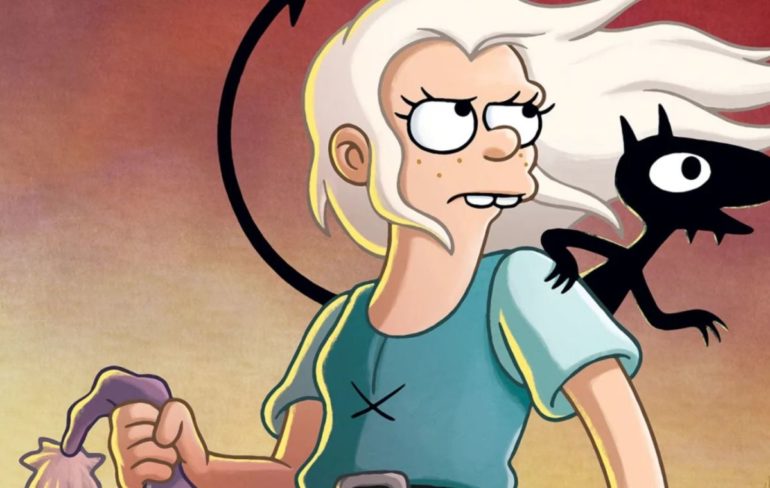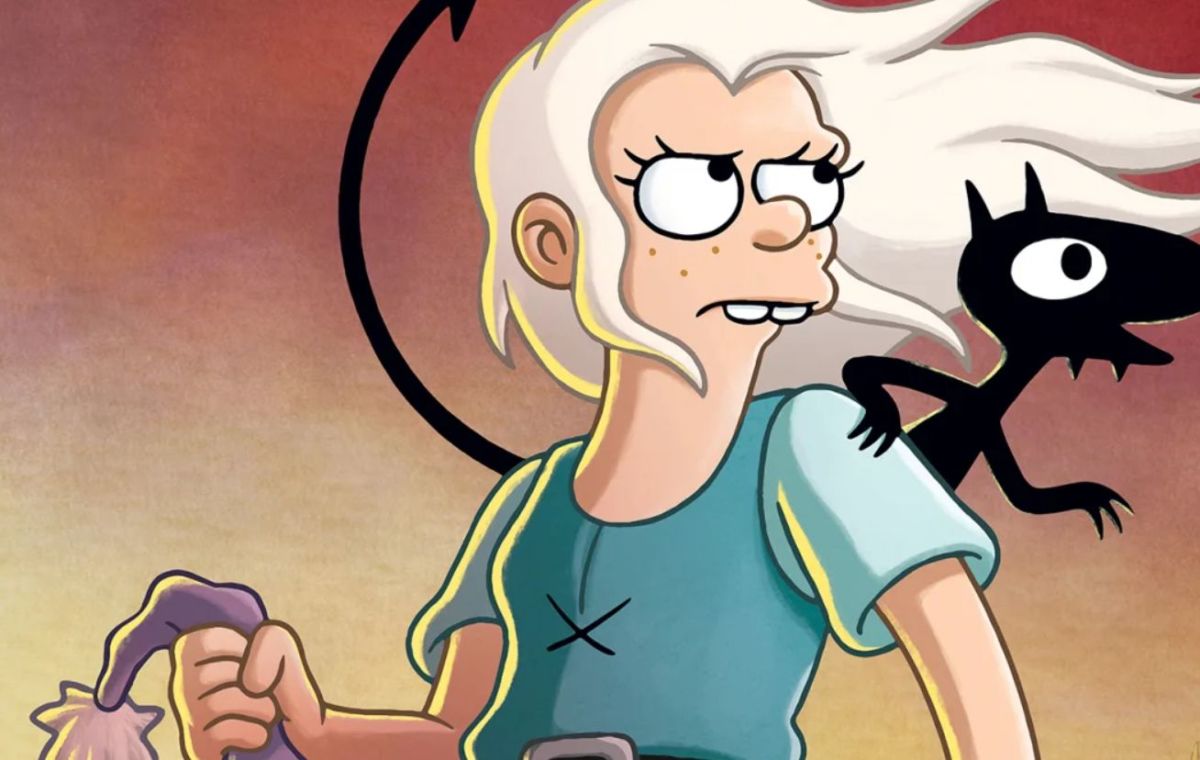Reviewers can never truly avoid bias. Even the most neutral commentator in the world will, by definition, be drawing on the entirely subjective opinions they’ve formed. So take it with a grain of salt when I, someone who’s written repeatedly and passionately about The Simpsons – to the point that my editor begged me to at least try referencing something else – say that the second season of Disenchantment is like being stabbed in a sensitive area by a close friend.
The trouble there is simply that it feels too much like The Simpsons, and, indeed, Futurama, on every level. There’s familiar faces like David S./X. Cohen behind the scenes, familiar voices like John ‘Bender’ DiMaggio in the cast, and most unavoidably of all, it’s Matt Groening’s distinctively bug-eyed, overbitten art style throughout.
(Not to mention a few familiar-sounding jokes.)
As such, it’s particularly disheartening to see Disenchantment already falling victim to the same issues that began to plague The Simpsons and Futurama in their later years. Because of their sheer influence in the realm of animation, these issues are now fairly commonplace: animated sitcoms now tend towards being, more than anything else, joke delivery vectors with little to no concern as to how any given gag relates to the plot.
This results in desperately uneven content. One recurrent form is to have a character narrate what is happening seconds before we see that, yes, that exact thing is happening. One or other of these alone might work as a joke – together, it can’t help but feel that they have no confidence in keeping the viewer’s attention. A similar format is jokes that have to explain themselves. Rich Fulcher gets a truly execrable line in the first episode – something to do with a lie that Bean is being made sick by the chimneys in, as he immediately specifies, ‘this room that has no chimneys’.
What is the comedic payoff here? That the character is so ineffectual he cannot help but contradict himself within the same sentence? I realise there’s no better way to kill a joke than to pick it apart, but this line betrays such naked contempt for any kind of suspension of disbelief that one cannot help but go searching for any level on which it actually works.
Admittedly, that’s picking out a notably bad line. The rapid-fire, throwing things at the wall approach inevitably produces the occasional decent gag. This is probably the best I can possibly say of the show, that it has its moments – but so too does a stopped clock.
The business of comedy actually working has been rightly said to be all down to timing. Many of your truly great comedic works involve lines which could be utterly innocuous if they weren’t said with the right rhythm, with the punchline falling on the right beat. Disenchantment is terrible at this. Seemingly every shot drags on for seconds more than it needs to – were you to trim out all this dead space, episodes would be running closer to twenty minutes.
https://www.youtube.com/watch?v=Q00bB9o7Eok
The show’s trouble with pacing betrays a wider issue – it simply doesn’t know what it wants to be (particularly unforgivable coming from its experienced team). By turns, it attempts to be episodic and self-contained, but also to hark at season-long plot arcs, and, with a foot in both these camps, ends up not doing either particularly well. If it was definitely a series of self-contained adventures, like its Groening forebears, then it would make sense to spend the first two episodes of this run returning to the status quo. But if it’s a wider ongoing story, that can’t help but be a step backwards.
Futurama’s Fry once said of his bootleg version of Ally McBeal: “It was just a matter of knowing the secret of all great TV shows – at the end of the episode, everything’s right back to normal.” But Fry was immediately proven wrong when the camera panned out to reveal New New York in flames, and was proven wrong further when Futurama’s own recurring plot arcs came to fruition very well. Leela’s parents being mutants and Nibbler being a creature of ageless wisdom were much better payoffs than Bean’s mother turning out to be evil.
Even with all those plot developments being equal, and that’s a big hypothetical, you’d need to be invested in the characters for them to hit home. This will doubtless be the most subjective part of what’s already a powerfully subjective review, but frankly Disenchantment’s central cast don’t cut the mustard. Most of them feel like ancillary characters, which is ironic, because Disenchantment’s actual ancillary characters tend to be a good deal more charming – their shorter screen time lets them stick to one role and do that, rather than flailing about trying to meet the demands of the plot.
Bean, as the spunky, drunky princess, is at least natural protagonist material, even if she’s more of an indistinct everyman than that role really should be. Luci, meanwhile, appears to have been created using a paint-by-numbers edgy character kit. Despite being devoted to evil, he’s still one of the good guys. Why? Who can say. Other characters keep mistaking him for a cat, unsure of what, exactly, he is – and if this hits home, it’s probably because the viewers aren’t sure either.
Elfo, though – even the writers aren’t that clear what he is. I’ve written before that he’s at his strongest when he’s being ersatz Ralph Wiggum, and I love Ralph, but there’s an endless list of good reasons why he’s not a main character. The rest of the time, he’s being shoehorned into pretty much any given role – by turns bitter, critical, even remorseful, then, with no warning, he’ll snap back to the usual amiable duncery. He’s not exactly a consistent, recognisable character archetype for the ages, is what I’m getting at. In fifty years’ time nobody’s going to be analysing the subtle journey Elfo takes as a character.
But if you don’t find yourself particularly invested in the characters and their adventures, it’s understandable, since it seems as if the creators aren’t either. The main power trio hover blithely in and out of being sympathetic, but the real giveaway comes in an episode when the show abandons its established milieu, apparently sick of its own swords-and-sorcery backdrop. If the creators themselves can’t find anything interesting about it, why should the viewers?
I say all this with the full knowledge that I’ve got my knives out. As I warned you in the intro, I’ve got capital-O Opinions about this. But where I’ve been by far the most subjective about Disenchantment was in the interim, between its first run and this, where I and a great many other commentators offered a fumbling defence of ‘it’s still finding its feet‘.
Hogwash. Futurama arrived in the same boat, with all the weight of expectation around its neck, and still hit the ground running. Disenchantment is a project assembled by experienced and incredibly successful TV bods, acted by a series of big names, and put out by Netflix, if not the oldest then certainly the most prestigious of the streaming services. Everyone involved should have known better from the start, and on this basis it deserves less benefit of the doubt, not more.
Some of the coverage you find on Cultured Vultures contains affiliate links, which provide us with small commissions based on purchases made from visiting our site.


